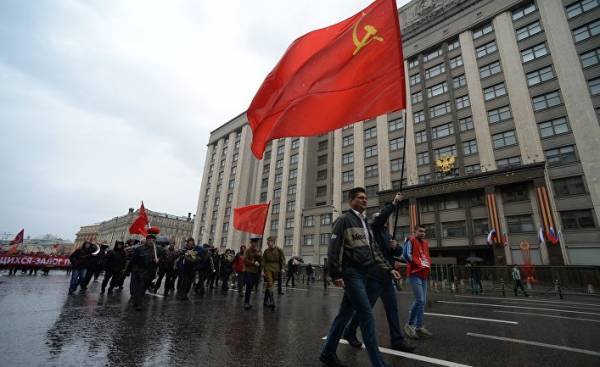
Almost 26 years ago, President Boris Yeltsin issued a decree that banned the activity of the organs of the Communist party in the factories, in universities and in all other organizations and institutions on the territory of the Russian Federation. However, the bold Yeltsin’s decree in some sense was already excessive, the Communist party of the Soviet Union (CPSU), formerly formidable organizational weapons had already been knocked down own incompetence and brutality, to the extent that the society was merely indifferent.
Once the great political parties of the Western countries and also some developing countries today, too, as it may seem, moving fast toward oblivion. But if the death of the Communist party was a perfectly logical (Yeltsin’s decree came just a few months before the collapse of the USSR), the decline of the major political parties in countries such as France and India, to explain difficult.
The French President Emmanuel macron has just ensured his political movement, existing for only one year, the vast majority in the French National Assembly. While the Socialist party with which the Makron was connected, working as the Minister of economy, he, apparently, sent to the “dustbin of history” of Trotsky. Another major French party — center-right “Republicans”, deriving the idea in the political heritage of Charles de Gaulle, the situation is not much better.
Until recently, it seemed that the labour party of great Britain, under the leadership of the ultraleft Jeremy Corbin is on the verge of extinction. But she’s got kind of a reprieve, due to the complete incompetence of the conservative Prime Minister Theresa may, emerged during the last electoral campaign to the Parliament. However, whether Corbin actually unite and revive his party remains absolutely not clear.
In the developing world, India has witnessed the decline of the Indian national Congress (INC) party’s first Prime Minister Jawaharlal Nehru, which led India to independence from Britain. Under a weak dynastic leadership of Sonia Gandhi (the widow of assassinated Prime Minister Rajiv Gandhi, grandson of Nehru and son of Prime Minister Indira Gandhi) and her son Rahul, the Congress now seem incapable of keeping parliamentary seats even in its traditional bastions, for example, the state of Uttar Pradesh. Moreover, the main rival of INK — the ruling party “Bharatiya Janata”, — apparently, is already guaranteed to itself a victory in the upcoming parliamentary elections in 2019.
In South Africa another great party of national liberation — the African national Congress, contributed to the demise of the apartheid regime, experience the same decline. After only 18 years after the departure of Nelson Mandela as President of South Africa, the ANC began to fall apart under the destructive corrupt leadership of President Jacob Zuma. The official split between the rival factions that are configured on a fierce fight can happen this year, when the ANC will choose its new leader.
Of course, the great political parties have died before. In the XIX and early XX centuries the main rival of the conservatives in the UK was the Liberal party, not labour. The party flourished under the leadership of figures such as William Gladstone and David Lloyd George. However, she disappeared just a few years after the end of the First world war; this process is described in the book of British journalist-historian George Dangerfield “the Strange death of liberal England”.
In Italy arose in the postwar era, the political parties — Christian Democrats, Communists and socialists have experienced something like mass extinction, when in 1992 the outbreak of the corruption scandal Tangentopoli (“Watched”). And in 1993, the Conservative party of Canada was nearly destroyed in the parliamentary elections, after which it lost almost all its seats, retaining only two seats out of 151.
There are many explanations for the collapse of the political parties. The transition of voters from the working class into the middle class equally contributed to the destruction of the Communist parties in Western Europe and the collapse of the Soviet regime.
Broadly speaking, in countries where coalition governments are composed of parties with similar ideologies, voters may find it easier to change their political affections. Today it is especially common, because voters were treated to both brands (which you can change as soon as they ceased to meet the tastes of consumers), and not as a steadfast symbol of “tribal” loyalty.
In addition, voters today increasingly pay attention to just one or two key ideas of the party, not its entire program as a whole. It is this mentality and allows you to flourish “the party of one issue”, for example, of the independence party of great Britain, sosredotochimsya on the issue of immigration.
The increasing number of referendums in developed democratic countries is a direct consequence of this reversal to a customer-oriented policy. The problem, however, is that referendums weaken political responsibility: they open the way to making poorly informed decisions, based on simplified questions of the referendum. So, for example, occurred with irresponsible vote in Britain for Prexit. In such situations, once an ironic joke the playwright Bertolt Brecht, the only alternative is to “dissolve the people and elect a new one”.
Consumer sentiment of the electorate is partly explained by the decline of parties like the Socialist party of France, but they do not explain the decline of the Indian national Congress and the ANC. Their problem, apparently, is connected with conceit and arrogance.
In the Indian national Congress arrogance is mostly hereditary. The Gandhi family, starting from Nehru, Indira and Rajiv Gandhi and ending with the current incompetent leader of the party Rahul, perceived control and guidance by Congress as a right given from birth, which cannot be cancelled, regardless of the actual skills or the skills of the person.
The ANC’s arrogance, seems more like a conceit of the Communist party — cocky feeling of “possession” state, because of which the corruption is perceived as a kind of right received in the elections. The arrogance of this kind cuts off the party from its real supporters, which then becomes easier to look for — and find — more appropriate alternatives.
However, in politics, the death may not be eternal. For example, the Institutional revolutionary party of Mexico (PRI) ruled the country for 71 years until 2000, was defeated in the election. At the time, many believed that the PRI would never return to power. But in 2012, she did, thanks to the election of current President Enrique peña Nieto.
These perspectives probably explains why so negligent attitude of Gandhi family and Zuma to the decay of their parties. The question, however, whether something risen from the dead, ever be what it was.







